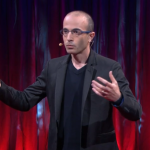Irreconcilable Differences: The Divorce of Materialism and Truth
by Philip Lewandowski
Filed under Anthropology, Belief, Evolution
According to many today, the advance of the natural physical sciences continues to shrink the “space” for God. The “gaps” where someone can place God are decreasing, and therefore the “God hypothesis” will one day be swallowed whole by the progress of the scientific endeavor. Even more, the “space” where one could posit the human person as something more than just a complex, organized collection of matter and energy is said to have disappeared.
While I find a materialist metaphysics very hard to coherently defend, I do find it interesting that an increasing amount of “secular” philosophers, who have no particular sympathy towards deism or theism, are beginning to question the assumption that materialism is true.1 It seems the rise of the physical sciences has led to matter and energy being proclaimed as the one true “god.”
As we read a few months back on Strange Notions, in Pat Shultz’s article on the personal pronoun “I” and inner subjectivity, atheism and materialism seem to be connected in an intimate manner. But if we can show that materialism is false, beyond a reasonable doubt, we can begin to proclaim with Dr. Edward Feser that materialism is in fact one of the last superstitions and one of the final myths that we have created.2 We then can begin to recognize that there exists more to reality than simply matter and energy. Our heart and mind can then be opened to a deeper and more nuanced understanding of the human person and ultimately to the possibility of the Divine.
While I will not propose arguments for either this more complete account of the human person or a specifically theistic worldview in this essay, I do wish to address the coherency of actually holding that materialism is true. Materialism is the metaphysical proposal that all that exists is material in its nature. This means that no immaterial, spiritual entities exist in all reality. While there are many issues that arise which challenge the coherency of the materialist hypothesis, one of the most basic is the existence of truth. The reason is that truth, and our beliefs in general, necessarily seep into every facet of our human condition. Every coherent thought we have and word we proclaim is some sort of belief statement about the true nature of reality. Even when we aim to purposely deceive, we are working off of the assumption that there is a truth about reality that we are trying to keep hidden. We cannot say that truth does not exist without at the same time contradicting ourself.
But there is a key distinction that makes the human person so unique. It is not simply the case that it is possible that some of the beliefs we hold are actually true. Rather, the human person is capable of using reason to hold that certain beliefs are more rational to hold as actually true over alternative beliefs. In other words, it is possible for the human person to distinguish between beliefs that merely appear true and beliefs that are actually true. This is done through the proper use of reason and the intellect. The alternative to this position is complete skepticism, where a person holds that one cannot tell the difference between a belief that is actually true and one that only appears to be true.
We can already begin to see that the position of complete skepticism is incoherent and must be rejected. The statement, “I hold that it is actually true that a person cannot tell the difference between a belief that is actually true and one that only appears to be true” is clearly an incoherent proposition. In a more succinct manner, what we are saying is that, “I hold that complete skepticism is actually true.” This is a self-contradiction and what is called a “proof by contradiction”. Therefore, we reject complete skepticism (this will be an important part of the actual arguments below) and move on to the main attraction.
We will be using the form of a basic logical philosophical proof. If you read the series at Strange Notions about the existence of an unconditioned reality, this should look very familiar. This type of argument can be very strong, because if the logical form is valid and the premises are true, then the conclusion is necessarily true (from the metaphysical—the ontological—point of view). From an epistemological point of view, if the premises can be shown to be true, beyond a reasonable doubt, then the conclusion that follows is also to be held as true beyond a reasonable doubt.
We will be proposing all the ways in which truth could arise within the human person, while at the same time assuming that the human person is a purely material being. If all these options must ultimately be reduced to absurdity, using valid logical form and true premises, then we will also reduce the assumption of materialism to absurdity. This will be done by taking each of the options one at a time, assuming it is true, and then working to show that the position is actually internally incoherent. And if the position can be shown to be internally incoherent, then means we must reject that original assumption.
The Argument
I. Either all of reality is material in nature (i.e., materialism is true) or all of reality is not material in nature (i.e., materialism is not true).
We start by breaking our options for reality into two absolute groups. There are no other options available. Either all of reality is material in nature (i.e., materialism is true) or all of reality is not material in nature (i.e., materialism is not true). We do this so that if the assumption that materialism is true leads to a logical contradiction, then we must conclude that materialism is not true.
We will start by assuming that materialism is true. This means that the belief-making mechanisms of the human person are ultimately reducible to the overall physical state of the human person. Many would point towards the chemical processes in the brain and the overall state of the nervous system, but of course there may be more “materiality” to the human person that we have yet to discover and study. This is the reason we use the general statement of “the overall physical state of the human person”—whatever that physical state may end up being. And the reason this is true is because nothing but matter and energy exists, so all our beliefs ultimately arise from the complex interaction of matter and energy.
II. If materialism is true, we have three alternative possibilities:
(A) The human person’s belief-making mechanisms do not follow any sort of consistent natural physical laws.
(B) The human person’s belief-making mechanisms do follow complex natural physical laws and always lead to true beliefs.
(C) The human person’s belief-making mechanisms do follow complex natural physical laws and do not always lead to true beliefs.
What we have done here is lay out all possible options in all reality. (I did not include the option of natural laws always leading to false beliefs, since that option can be easily seen to be incoherent.) We will take each option in turn to see whether it can account for holding beliefs that we have reason to believe are more rational to hold as actually true than alternative beliefs; that is, we will see if any of these options can account for the fact that the human person is capable of distinguishing between beliefs that are actually true and beliefs that only appear to be true.
III. The Materialist Options evaluated
Materialist Option (A)
- We assume that Materialist Option (A) is true. (The human person’s belief-making mechanisms do not follow any sort of consistent natural physical laws)
- Complete skepticism is false.
- If the human person’s belief-making mechanisms do not follow any consistent natural physical laws, then all the matter/energy that makes up the human person’s belief-making mechanisms behave in random ways.
- If the belief-making mechanisms behave in random ways, then the beliefs that come from this belief-making mechanism will also be random.
- If the beliefs are random, then the human person cannot rationally hold that any belief is actually true, rather than only appearing to be true.
- If the human person cannot rationally hold that any belief is actually true, rather than only appearing to be true, then complete skepticism is true.
- Contradiction between premise (2) and premise (6).
- Therefore, we reject the original assumption of Materialist Option (A).
The job at hand now is to show that each of these premises is true beyond a reasonable doubt. Premise (2)—that complete skepticism is false—was demonstrated above.
Premises (3) and (4) are evident from the fact that if even a single part of the matter/energy that forms the human person’s belief-making mechanisms does not follow any consistent physical laws, then the beliefs that come from them will be random. To be random means that our belief-making mechanisms are not directed towards coming to true beliefs—in fact these mechanisms aren’t directed towards anything!
Premise (5) and (6) simply shows that if our beliefs are completely random then we have no way to rationally hold that any of our beliefs are actually true, rather than simply appearing to be true. Furthermore, our belief in the fact that our beliefs are random would itself a random. This leads to complete skepticism, which creates an internal contradiction in this hypothesis. Therefore, we reject Materialist Option (A). The belief that the human person’s belief-making mechanisms do not follow any sort of consistent natural physical laws is false.
Materialist Option (B)
- We assume that Materialist Option (B) is true. (The human person’s belief-making mechanisms do follow complex natural physical laws and always lead to true beliefs)
- If the human person’s belief-making mechanisms always leads to true beliefs, then every belief the human person holds is true.
- The human person does not always hold true beliefs.
- Contradiction between premises (2) and (3).
- Therefore, we reject the original assumption of Materialist Option (B).
This option is the one that is most easily seen to be false. The proposal that we always come to true beliefs is false by the fact that two people can, and many times do, hold contradictory beliefs to be true. It is also shown forth by the fact that we assume that science has shown that people have come to false beliefs about reality in the past. Those entering into discussion on a site like Strange Notions are actually working from the assumption that they are coming together to discuss what the actual truth of reality is, which assumes that false beliefs about reality are possible. With that said, we can reject Materialist Option (B). The belief that the human person’s belief-making mechanisms do follow complex natural physical laws and always lead to true beliefs is false.
Materialist Option (C)
- We assume that Materialist Option (C) is true. (The human person’s belief-making mechanisms do follow complex natural physical laws and do not always lead to true beliefs.)
- Complete skepticism is false.
- If the human person’s belief-making mechanisms follow natural physical laws, which do not always lead to true beliefs, then some beliefs a person holds are true and some they hold are false.
- If the exact same natural physical laws that govern the human person’s belief-making mechanisms do lead to both true and false beliefs, then the human person cannot rationally hold that any particular belief is actually true, rather than only appearing to be true.
- If the human person cannot rationally hold that any particular belief is actually true, rather than only appearing to be true, then complete skepticism is true.
- Contradiction between premises (2) and (5).
- Therefore, we reject the original assumption of Materialist Option (C).
Materialist Option (C) is probably the hypothesis that needs the most attention. This is because it seems to have the most promise of being able to describe reality as it actually is. Common human experience tells us that the human person can come to both true and false beliefs. And when we assume materialism, the belief-making mechanisms would seem to need to follow some sort of very complex natural physical laws. Obviously, if they didn’t always follow some sort of natural physical laws, then the coherency of our physical sciences is undermined, and we would be back to Materialist Option (A), which we addressed above. This is because the sciences rely upon the assumption that matter and energy actually do follow complex natural “physical laws” (even laws stating probabilities, such as those in versions of quantum mechanics, are natural physical laws nonetheless.)
So we again begin by acknowledging that complete skepticism is false. In premise (3), we simply point out that if the belief-making mechanisms of the human person do not always lead to true beliefs, then some of the beliefs that the person holds will be true and some of them will be false.
Premise (4) is the key premise in this argument. It points out that these consistent complex natural laws lead the human person’s belief-making mechanisms to sometimes hold true beliefs and at other times to hold false beliefs. In other words, the same law in the same exact situation can lead to either a true or false belief. If that is the case, then there is no way to tell whether a belief we hold is actually true, or whether it merely appears true. (The only way to avoid this conclusion is to hold a deterministic account of beliefs, where every belief we hold is true. This is Materialist Option (B), which we discussed above and found to be false.)
As has been the problem with all three of these proposals, there is no way to step back and use reason to say that this belief is actually true, rather than the belief only appearing to be true. In other words, complete skepticism is again true. Materialist Position (C) contains an internal contradiction. We can then reject Materialist Option (C). The belief that the human person’s belief-making mechanisms do follow complex natural physical laws and do not always lead to true beliefs is false.
IV. The Grand Conclusion
What we have done is evaluate all three options that would attempt to explain, at a metaphysical level, how the human person would come to beliefs on a materialistic view of reality. What we have found is that all three of these positions are internally incoherent. Because of this we can reject the original assumption that all of reality is material in nature and conclude that there exists in all of reality more than just matter and energy—materialism is false. But even more specifically, because we are dealing with the belief-making mechanisms of the human person, we can conclude that the human person itself is not merely a material being.
The fact that this is a philosophical proof means that no finding in science could in principle undermine the conclusion. The only way to disprove this conclusion would be to use philosophical argument. Because of this fact, “promissory materialism”, the belief that one day the sciences will be able to explain all of reality in terms of matter and energy, is of no use. It does not matter what science discovers about the physical “laws” of the universe. It does not matter what other discoveries science makes in regards to quantum physics, string theory, multi-verses, or any other surprises this beautiful and vast cosmos has in store for us. This is, in part, what makes good philosophical arguments so strong.
The Evolution Objection
When I have had discussions with others about the topic of materialism and truth, evolution naturally comes up. Many times evolution appears to be the savior of this whole materialist enterprise—if a materialist has tried to replace God with matter and energy, then Jesus is replaced by the theory of evolution.
The central point of the evolution objection is that evolution is a sort of “optimizer”. Evolution has no ultimate purpose, goal, or “end”, but the more beings who survive to reproduce with a certain trait means that there will be a higher probability of having that trait passed down to future generations. So it could be proposed that in the roughly four billion years since it is believed life first appeared on earth, the belief-making mechanisms have been optimized so that, at this point in history, we have very good reason to believe that the majority of our beliefs are actually true. This plays off of the fact that it is reasonable to believe that a biological being who holds more true beliefs would seem to have a higher probability of surviving.
The fact of the matter is this could all be true, but it would still not change the fact that materialism is an incoherent belief.
The reason for this is we are not debating whether the human person could actually hold some true beliefs. The above discussion hinges upon the question of whether it is possible to show that any specific belief we hold is actually true, rather than simply appearing to be true to us. If we can’t show this, then the human person is left in a state of complete skepticism, even in regards to the belief that “materialism is true”.
For example, “materialism is true” is a belief that the materialist needs to show is actually true, and doesn’t simply appear true to them. But the materialist necessarily saws off the branch that they are sitting on when they claim that materialism is true. This branch is itself the only thing that gives them the ability to hold that anything they hold is actually true. They are making the claim that materialism is true, but they cannot tell you if it is actually true, or if it only appears true. They destroy truth itself, which destroys their ability to hold any of their beliefs as being actually true statements. In fact, any thought a materialist has, or any statement that a materialist speaks, ends up being proof that materialism is false.
Truth is one of the key ways in which the transcendent nature of the human person makes its presence felt. This is why, over 2,000 years ago, Aristotle called the human person the “rational animal”. A rational intellect, a self-conscious nature, and a free will are all inextricably tied together. To be able to say that we have reason to believe that something is actually true, and doesn’t just appear to be true, is to “take a step back” from our belief. Picture it like placing the belief in front of you, and then objectively studying whether it is true or not. This is the reason why the human person can hold that it is rational to believe that some beliefs are actually, objectively true. And as we investigated at the beginning of this essay, the alternative, complete skepticism—that the human person cannot tell whether a belief is actually true or only appears true—is false.
So in the end, materialism and truth do have irreconcilable differences and must go their separate ways—to divorce and never become united, although it is, in fact, a union that never could have taken place.
It may be possible to boil down this entire essay to one statement: if complete skepticism is false, then materialism is also false.
But what then in regards to the proper conception of the human person itself? We have rejected materialism and we must also reject a dualist account, most prominently because of the mysterious and almost magical notion of how these two substances of an immaterial mind and material body would come together to interact. Our gaze must then fall to a type of hylomorphic account; an account that recognizes a distinction between the material and immateriality of the human person, but insists that the person is a single unified substance. This type of account must hold that the spiritual aspects of the human person do not reside in the living body, but rather must be identified with the entirety of the single unified living body—a living body that is a unity of both immateriality and materiality.
The next task is to defend and nuance this hylomorphic conception of the human person. I leave this task to the better equipped Mr. Patrick Schultz, who I just so happen to know has produced two fantastic essays on this exact topic (coming this Wednesday and Friday at Strange Notions.)
So we shall wait, not in the darkness of uncertainty, but in the light, knowing that philosophy can shed light on the issue of the true nature of the human person!
Related Posts
Note: Our goal is to cultivate serious and respectful dialogue. While it's OK to disagree—even encouraged!—any snarky, offensive, or off-topic comments will be deleted. Before commenting please read the Commenting Rules and Tips. If you're having trouble commenting, read the Commenting Instructions.













